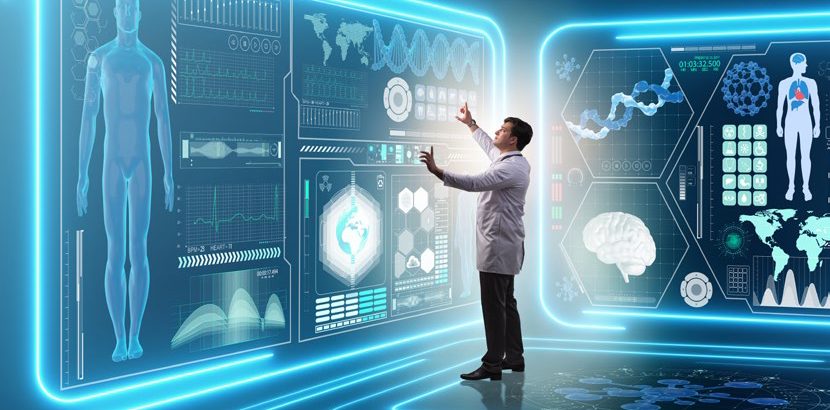Transforming Healthcare: The Rise of AI-Based Precision Health Technology
In recent years, the healthcare industry has witnessed a revolutionary transformation with the integration of Artificial Intelligence (AI) into precision health technologies. This synergy has not only improved patient outcomes but has also paved the way for more personalized and efficient healthcare solutions. In this blog, we will delve into the fascinating world of AI-based precision health technology, exploring its impact, applications, and the future of healthcare.
Understanding Precision Health Technology
Precision health technology focuses on tailoring healthcare interventions and treatments to individual characteristics, ensuring a more personalized approach. AI plays a pivotal role in this field by analyzing vast datasets, identifying patterns, and providing insights that empower healthcare professionals to make more informed decisions.
Enhancing Diagnostics with AI
One of the primary applications of AI in precision health lies in diagnostics and early disease detection. AI has revolutionized the diagnostic process by analyzing complex medical data such as genomic information, medical imaging, and patient records. Machine learning algorithms can detect subtle patterns and anomalies, aiding in early disease detection and accurate diagnosis, it also excels at analyzing complex medical data, ranging from genomic information to medical imaging. By identifying subtle patterns and anomalies, AI aids healthcare professionals in making accurate and timely diagnoses. This not only expedites the diagnostic process but also enhances the overall accuracy of results, leading to better patient outcomes
Personalized Treatment Plans and Remote Patient Monitoring
One of the key advantages of AI in precision health is its ability to analyze individual patient data to create personalized treatment plans. By considering genetic makeup, lifestyle factors, and environmental influences, AI algorithms can recommend treatments that are more likely to be effective for a specific patient, minimizing the trial-and-error approach often associated with traditional medicine. AI facilitates continuous monitoring of patients outside traditional healthcare settings. Wearable devices equipped with AI can track vital signs, detect early warning signs of deterioration, and provide real-time feedback to healthcare providers. This not only improves patient outcomes but also reduces the burden on healthcare facilities.
Treatment Decision Support
AI serves as a valuable tool for healthcare professionals in making treatment decisions. By analyzing patient data, including medical history, test results, and current symptoms, AI algorithms can provide evidence-based recommendations. This decision support system aids clinicians in choosing the most effective treatments, ensuring a more informed and targeted approach to patient care.
Drug discovery and development
It is a complex and time-consuming process that traditionally relies on experiential testing of chemical compounds. The integration of AI-based precision health technology has the potential to revolutionize this process by making it more efficient, cost-effective, and personalized. AI is being utilized in various stages of drug discovery and development and a few are given below
(i) Target Identification and Validation:
Traditional Approach: Identifying and validating drug targets involves extensive biological experiments and data analysis.
AI Contribution: AI algorithms can analyze vast datasets, including genomics, proteomics, and metabolomics, to identify potential drug targets more efficiently. Machine learning models can predict the likelihood of a target’s involvement in a disease based on various data inputs.
(ii) Drug Design and Discovery:
Traditional Approach: Chemists experiment with various compounds to identify potential drug candidates.
AI Contribution: AI algorithms, including deep learning models, can predict the biological activity of molecules, accelerating the drug discovery process. Generative models can even propose novel chemical structures for potential drugs.
(iii) Preclinical Testing:
Traditional Approach: Involves extensive in vitro and in vivo testing to evaluate a drug candidate’s safety and efficacy.
AI Contribution: Predictive modeling using AI helps prioritize and optimize lead compounds, reducing the number of candidates that need to be tested in the laboratory. This can save time and resources.
(iv) Clinical Trials:
Traditional Approach: Clinical trials are lengthy and expensive, involving thousands of participants.
AI Contribution: AI can optimize patient recruitment, identify suitable trial locations, and predict patient responses. Natural language processing (NLP) can also help extract valuable insights from medical literature to inform trial design.
(v) Personalized Medicine:
Traditional Approach: One-size-fits-all treatments are the norm.
AI Contribution: AI enables the development of personalized treatment plans based on individual patient data, including genetics, lifestyle, and other health factors. This approach, known as precision medicine, aims to provide the right treatment to the right patient at the right time.
Challenges and Ethical Considerations
AI models heavily depend on large datasets, and if these datasets are biased or incomplete, it can lead to biased predictions and recommendations. Healthcare data is sensitive and highly regulated. Sharing and storing such data introduces significant privacy and security concerns. Rapid advancements in AI may outpace the development of regulatory frameworks and guidelines. AI solutions may face resistance if they disrupt existing clinical workflows or are challenging to integrate into the healthcare system. The points given above are some of the challenges for AI-based Health technology.
The Future Landscape
Looking ahead, the integration of AI in precision health technology is expected to continue evolving. Advances in machine learning, robotics, and data analytics will further enhance healthcare delivery, making it more patient-centric and efficient. The emergence of AI-powered virtual health assistants and decision support systems will empower both patients and healthcare professionals.
Conclusion
AI-based precision health technology is at the forefront of revolutionizing healthcare, offering a myriad of applications that enhance diagnostics, personalize treatment plans, and transform drug discovery. While the journey is promising, it is essential to navigate the path with a keen awareness of challenges and ethical considerations. The integration of AI in precision health not only signifies technological advancement but also underscores the commitment to delivering healthcare that is not only effective but also ethically sound. As we embrace this transformative era, the synergy between AI and precision health holds the key to a future where healthcare is not just accessible but truly personalized for individuals worldwide.
Source
- https://www.ncbi.nlm.nih.gov/pmc/articles/PMC7877825/
- https://www.bitsathy.ac.in/digital-twin-in-healthcare/
- https://www.ibm.com/topics/healthcare-technology

